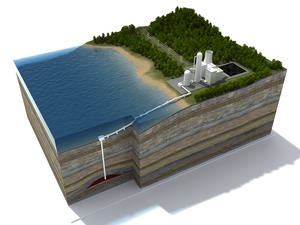
Court decision puts Norway on the hook for massive CO₂ Storage build-out
A ruling by the European Free Trade Association Court that Norway’s continental shelf falls under the European Economic Area Agreement could dramatic...
News

Publish date: December 5, 2010
Written by: Anne Karin Sæther
Translated by: Charles Digges
News
After several years of playing tug of war, the climate negotiation’s Subsidiary Body for Scientific and Technological Advice (SBSTA) has cleared a concrete proposal that could make CO2 capture and storage (CCS) a part of the CDM system.
The proposal will be considered by national environmental ministers who are arriving in Cancun early this week.
“It is positive that the debate will come up at the ministerial level, and that it is now possible to find a good solution here. We are much closer to a breakthrough than ever before, “said Paal Frisvold, chairman of Bellona Europa.
The CDM is one of the so-called flexible mechanisms of the Kyoto Protocol that allows industrialized countries to invest in emissions reducing projects in developing countries, and have these projects count toward their own emissions reduction obligations under the Kyoto Protocol.
Bellona is a proponent of CO2 capture and storage and regards CDM credits as one of several tools that can promote the climate solution that CCS represents.
“In order for developing countries to grow out of poverty, they need large amounts of energy, and in a transitional period they too will be forced to use fossil fuels. Then the emissions from the fossil sources should be captured and stored safely, “said Frisvold.
Opposition to CCS being part of the CDM is partly due to disagreement on whether CCS will make a large enough contribution to development in developing nations. The CDM system is meant to contribute both to development and emissions cuts to battle climate change.
Some emerging economies have opposed to including CO2 capture and storage in the CDM despite the fact that they support CO2 sequestration as part their own climate efforts.
It has been speculated that some are concerned that CO2 capture and storage projects would compete with other renewable energy projects within CDM. According to Carbon Counts, however, CCS is unlikely to take more than 6-9 percent of the CDM market.
These opponents will now, however, no longer stand in the way for raising t the debate about CCS in CDM to a higher level – and the result may be that CCS will have a new source of funding in CDM quotas.
Bellona hosts a series of workshops on CCS at the climate summit in Cancun. Among Bellona’s guests at Saturday’s workshop entitled “Resolving concerns about CO2 capture and storage in the UNFCCC: A policy brief by the World Resources Institute” were representatives from Fiji, South Africa and Zambia – countries that have previously been reluctant to get CCS into the CDM.
Friday, several Brazilians came to hear about the potential of combining CCS with renewable energy in the form of biomass (bio-CCS).
 Photo: (Foto: Anne Karin Sæther/Bellona)
Photo: (Foto: Anne Karin Sæther/Bellona)
Although negotiations on CCS and the CDM has come far, there is still much to be clarified. An effort to create strict and good regulations has been set in motion. CCS projects are large, expensive and relatively long lasting. If CCS projects are to be included in CDM, the question of integrity is crucial.
“In recent years, much has been done to develop the framework and procedures that will contribute to CCS being conducted in a proper way. The regulations discussed in SBSTA are based on the regulations we have in the EU, USA and Australia, “said Frisvold.
The process to develop rules and a system for CCS within the CDM will take time. As Bellona understands it, this will continue until the next climate summit to be held in Durban, South Africa in December 2011.
A political decision on whether CCS will become part of the CDM system may already be in the offing for the climate summit in Cancun, which ends on December 10.
Bellona believes a number of different solutions must be adopted to reduce greenhouse gas emissions. Energy efficiency, renewable energy and CCS are the most important.

A ruling by the European Free Trade Association Court that Norway’s continental shelf falls under the European Economic Area Agreement could dramatic...

Bellona held a seminar on countering Russian disinformation in the Arctic at the Arctic Frontiers international conference in Norway

Our December Nuclear Digest, reported by Bellona’s Environmental Transparency Center, is out now. Here’s a quick taste of three nuclear issues arisin...

Bellona has launched the Oslofjord Kelp Park, a pilot kelp cultivation facility outside Slemmestad, about 30 kilometers southwest of Oslo, aimed at r...